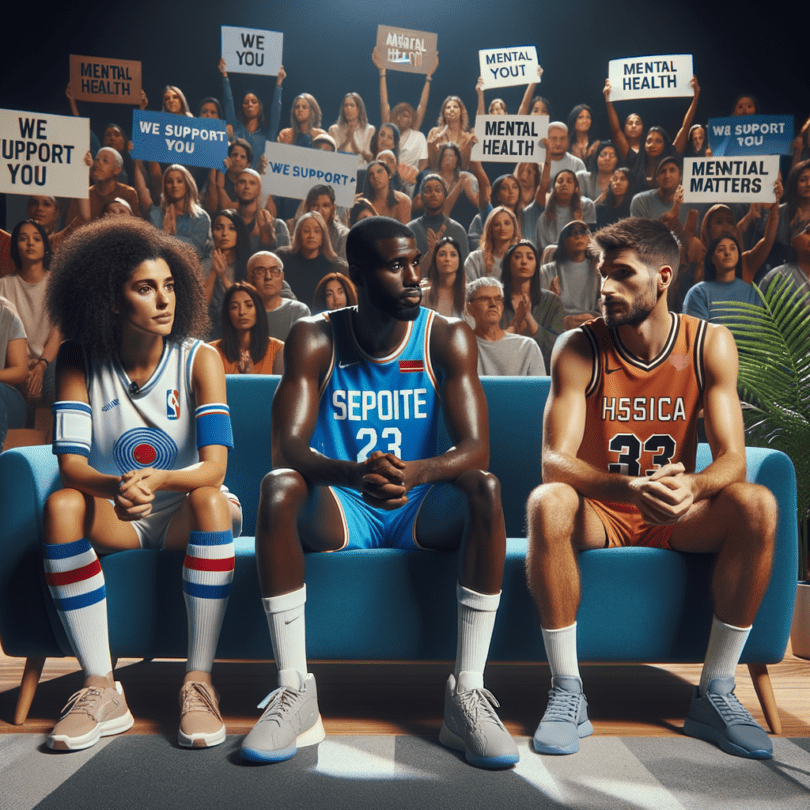On June 5, 2024, the Boston Red Sox placed relief pitcher Chris Martin on the 15-day injured list due to anxiety, not for a physical injury like a sore shoulder or a tight elbow. Traditionally, the MLB’s injured list was reserved for players with physical ailments, and if players missed games because of mental health issues, the reasons were often vaguely termed as “personal reasons.” When athletes did speak openly about their mental health struggles, they often faced skepticism or criticism from reporters and fans. In 2009, an article by The New York Times quoted a psychiatrist doubting whether a professional baseball player could suffer from social anxiety disorder, suggesting that baseball inherently teaches players to handle failure and that someone with such a disorder would not pursue the sport. However, perceptions have shifted significantly since then. Today, there is an increased effort to ensure professional athletes have access to mental health support.
The NBA, for example, introduced its Mind Health Program in 2018, which requires every team to have a licensed mental health professional readily available for players and staff. Similarly, the NFL mandates teams to employ a behavioral health clinician who is present onsite at least twice a week. But, what do fans think about this issue? Are athletes with mental health challenges perceived as weak or less likable? My colleagues and I have conducted a series of studies examining how fans respond to athletes who speak out about their mental health experiences, even if these issues cause them to miss playing time. Despite progress in recent years, many still find it challenging to discuss mental health problems at work. A 2022 global survey revealed that 58% of respondents felt uncomfortable sharing their mental health struggles at their jobs, often fearing negative repercussions. In the realm of sports, the situation can be more severe. Elite athletes encounter mental health issues more frequently than the general public, compounded by a culture emphasizing mental toughness. While regular treatment for physical injuries is part of the job, seeking help for mental health issues is often seen as a sign of weakness. This stigma discourages athletes from discussing their mental health concerns.
Some fear disbelief or rejection from teammates and fans, while others worry about losing sponsorships or contracts. Additionally, poor mental health literacy among many athletes and coaches presents another obstacle. Nevertheless, this narrative is beginning to change, partly due to high-profile athletes like Kevin Love, DeMar DeRozan, A’ja Wilson, and Michael Phelps, who have shared their mental health challenges recently. Their stories, highlighted in mainstream media and sports outlets, help the public understand that these admired athletes are vulnerable to mental health conditions like anyone else. A pivotal moment occurred when tennis star Naomi Osaka withdrew from the 2021 French Open citing mental health reasons. Tournament organizers initially fined Osaka and threatened further sanctions if she failed to meet media obligations, prompting her withdrawal and sparking widespread debate. Some media and fans criticized Osaka, claiming media duties were part of her professional responsibilities, while others, including Serena Williams and Martina Navratilova, commended her for prioritizing her mental health. Support also came from Nike, one of her main sponsors, standing by her decision. In a 2022 study, we analyzed social media responses to Osaka’s decision and found that 51% of Twitter (now called X) posts and replies supported her, with only 19% showing negativity and 30% remaining neutral. Osaka went on to be featured on the cover of Time magazine, recognized not for a Grand Slam victory but for catalyzing important discussions on mental health in sports. Later that year, gymnast Simone Biles withdrew from the Tokyo Olympics women’s team gymnastics final for mental health reasons. Osaka’s actions inspired changes in league policies.
The Grand Slam committee, which had penalized her for a missed press conference, pledged to address players’ mental health concerns. In our most recent study, we explored fans’ perceptions of athletes disclosing mental health issues versus those discussing physical injuries. Was there any truth to the stigma feared by some athletes and coaches? We presented 255 U.S. participants with two scenarios: in one, an athlete took a break for mental health struggles, and in the other, for a physical injury, with the only difference being the reason for time off. Participants were randomly assigned one scenario, then reported the warmth they felt toward the athlete and their perception of the athlete’s competence. Our findings suggest fears of backlash may be unfounded. Participants actually reported more warmth toward athletes with mental health issues and viewed them as equally capable as those managing physical injuries.
Fans appear to value athletes who address these challenges and prioritize their mental well-being. For players concerned about losing endorsements for being public about mental health, it seems fans may find them more relatable and likable, perhaps even enhancing their value as brand ambassadors. This was evident in Chris Martin’s case, where fans, teammates, and the media largely supported him. Red Sox manager Alex Cora and chief baseball officer Craig Breslow both expressed their approval of Martin’s openness about his struggles.

